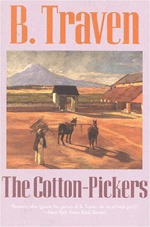Traven, B.: Bomullsplockarna
Utdrag ur boken
Take Apfel, a Hungarian. He arrived in Mexico with a few hundred pesos in his pocket but couldn’t find work. So he rented a small shack and bought tools from one junk dealer and some old sheet iron from another; out of this junk he made buckets and water tanks.
One day a man came and said: “Could you make me a tank?”
“Sure, if you give me an advance of one hundred pesos,” said Apfel. But he couldn’t make this tank single-handed.
In a Chinese eating joint he ran into a compatriot from Budapest, begging in rags. The man hade come into the joint, gone up to Apfel’s table, and asked in broken Spanish if he might have the half of a roll which was lying there unwanted.
“Take it,” said Apel. “Aren’t you Hungarian?”
“Yes, I’m from Budapest.”
“Are you looking for work?” Apfel asked
“Yes, I’ve been looking for work for a long while, but there is nothing.”
“No, there’s not much of anything.” Apfel agreed, “but I can get you work.”
“Really? I’d be so greatful if you could.”
“But it means a fourteen-hour stretch.”
“That’s all right, as long as it’s work an pays the money for food.”
“The pay’s not so good either. Only about two pesos and fifty centavos.”
“I’d be satisfied with that.” “Then come tomorrow morning,” said Apfel, and he explained how to find his work shack. “I work there, too; I’ve got a small contract.”
“I’m glad to be working with a fellow countryman.”
“You may well be”, said Apfel, “for who else would take you on? There’s absolutely no work to be had.”
The man started to work for Apfel, and he worked with a will. Fourteen hours a day. In tropical country. In a wooden shack under corrugated iron roof. Two pesos fifty a day. Fifty centavos a night for a bed – no not quite a bed, but a wooden frame with a piece of canvas stretched across it. In a flophouse, where bugs and mosquitoes made each night a hell. Fifty centavos for a noon comida at the Chink’s, and fifty more for supper there. Twenty centavos for a cup of breakfast coffee and ten centavos for two dry rolls. A few cigarettes a day. A flass of ice water for five centavos – perhaps two or three glasses during the long day. Then his shirt fell to pieces, his shoes already having gone west before he began to work for Apfel. New shoes consumed a full week’s work, a shirt two day’s work, assuming that he bought nothing to eat. This went on for two weeks, three weeks, four weeks. Then he was taken to the local poorhouse – malaria, fever, God knows what. Two days later he was crammed into a pine box and shoved into ground.
But Apfel fulfilled his contract for the tank and got an order for three more of the same. He could always find more starving immigrants, if not Hungarians, then Austrians, or Germans, or Poles, or Czechs. The port was swarming with them; and they were all so grateful to Apfel for giving them work. Now it was only twelve-hour day; he moved ahead with the times and didn’t want to exploit the unemployed. But it was still two-fifty a day, with three fifty for the foreman whom he now needed. It was going on four years since he had made his first tank; and was driving his own car and had built a house for himself in the North American Quarter.
Yes, even the bones of a compatriot to whom you extended a helping hand and whom because of this help, because of overwork, because of the rat hole in which he slept, because of lack of proper nourishment died of fever and was buried in a pauper’s grave – even this could be turned into gold. The Budapest newspapers reported that citizen Apfel had, “by his industry and enterprise made a sizable fortune in a few years.” Fortunes were made overnight that way. All you had to do was to exploit the various kinds of gold mines.
